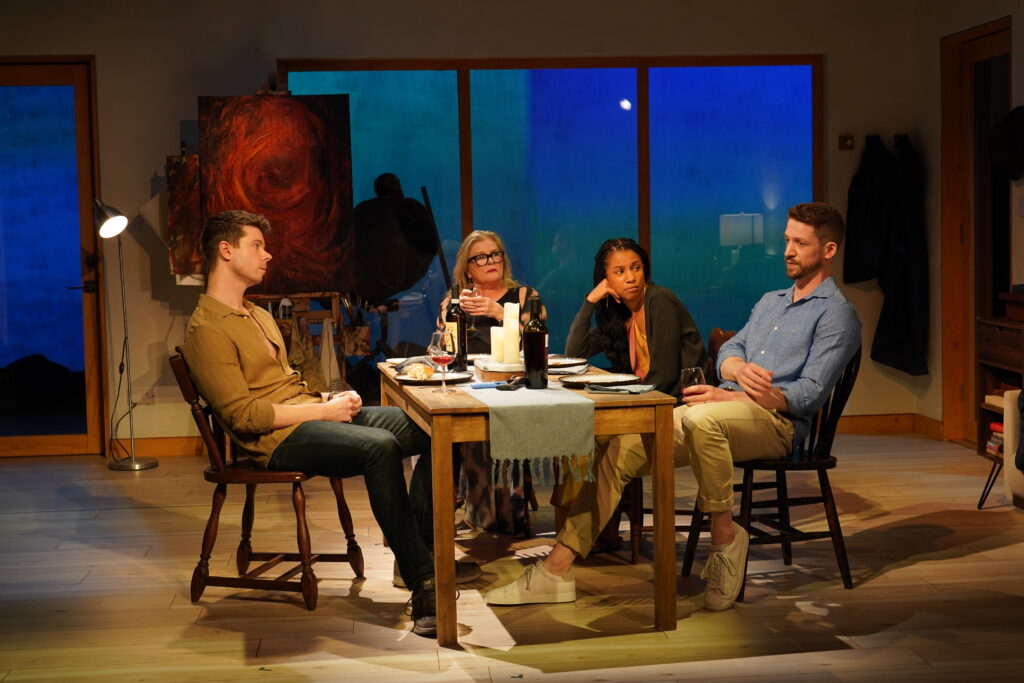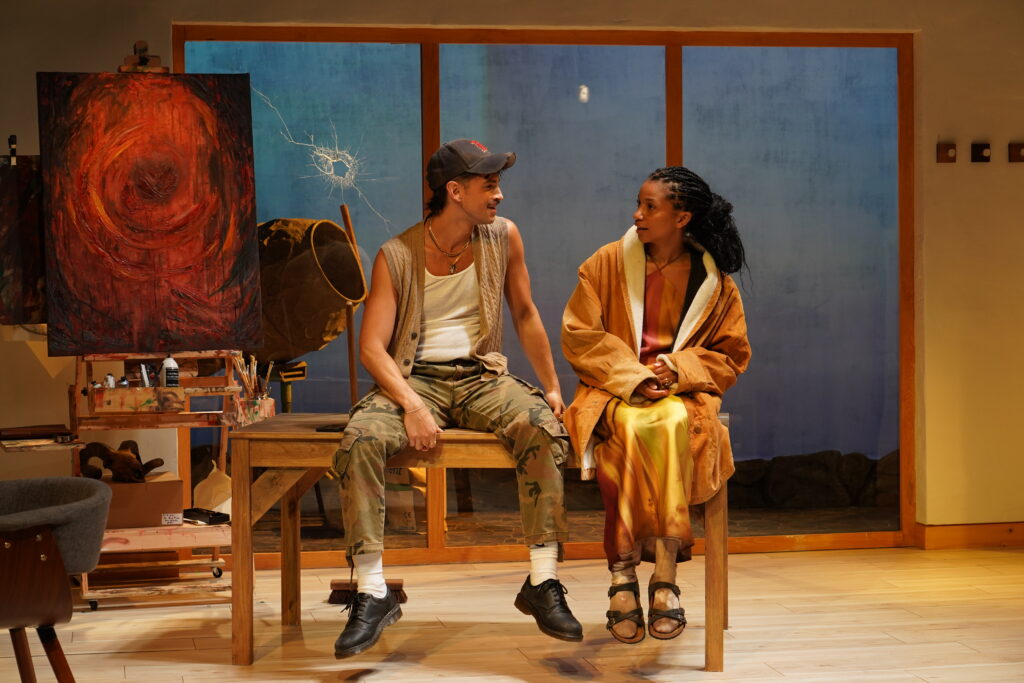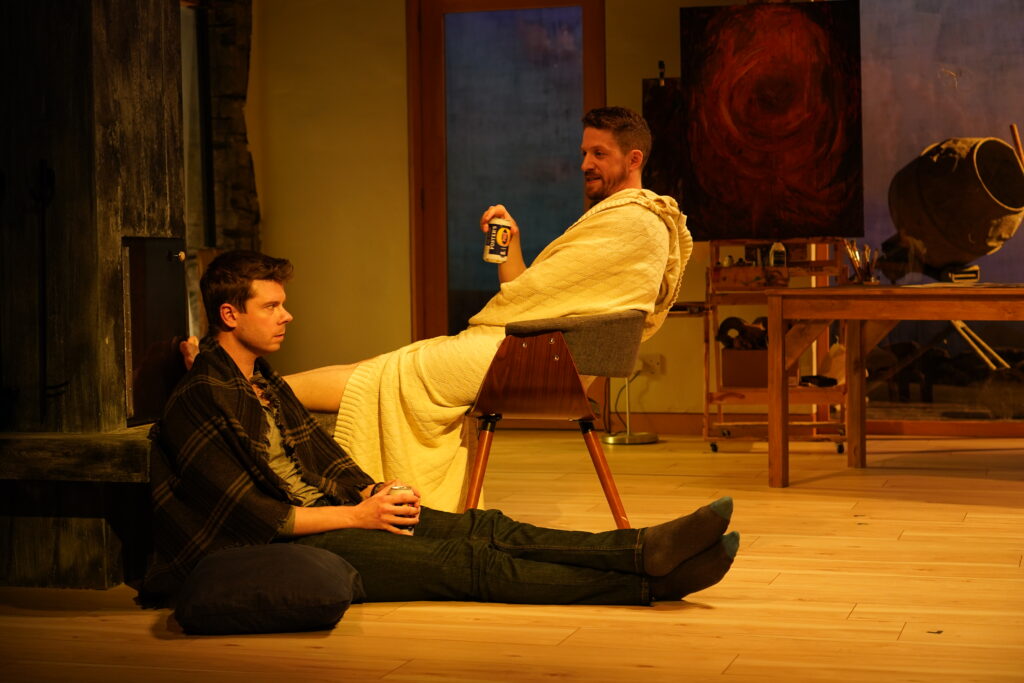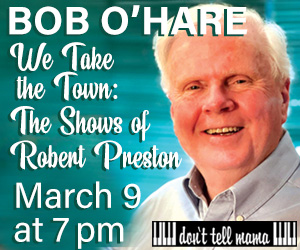Review by Carole Di Tosti
In Nancy Harris’ The Beacon, directed by Marc Atkinson Borrull, we witness a family drama that grows more complex in its unraveling. The conflict initiates when Colm (Zach Appelman), visits his mother, a successful, feminist abstract painter. Beiv (Kate Mulgrew), lives on an island cottage off the coast of West Cork, Ireland. Colm brings his young, American bride, Bonnie (Ayana Workman) to the cottage to introduce her to Beiv. As they plan to celebrate their honeymoon, the events cascade into an imbroglio among the characters which offers no satisfying resolution. Finally, in an explosive scene Colm confronts his mother about her responsibility regarding his father’s mysterious death. The Beacon in its North American premiere currently runs at the Irish Repertory Theatre until November 3rd.


During the course of Colm’s visit, in anger he alienates not only his wife, but his childhood friend Donal (Sean Bell). In Colm’s aggrieved characterization, Harris affirms that unresolved trauma and suppressed rage only intensify and spill out onto others. Unless one works through the morass of wounds, one’s burdened soul will never achieve peace.
In the first act Harris presents the conflicts with humor. The dialogue adheres more seamlessly than in the second act and is well-paced, ironic and theatrical. When Bonnie meets Beiv, she waxes eloquently about Beiv’s enigmatic, red-orange painting. Beiv’s latest work sits on an easel center stage. Its vibrancy sharply contrasts with the beige interior of the cottage living area, whose rear wall of windows at various atmospheric junctures looks out on projections of a roiling sea (an obvious symbol). With lights raised, the vision fades to the cement mixer on the patio.
Bonnie’s effusive comments about the painting’s profound meanings for women, “I’m instantly getting menstrual blood, the blood of childbirth, genital mutilation, hemorrhaging,” are “over the top.” In response to her gushing admiration, Beiv wryly says, “It’s a blood orange.” Beiv’s sardonic comment zings. She wins us over with her edgy, honest take-down of abstract art’s liability to encourage pretentiousness.


Clearly, Beiv is a woman who has reckoned with herself and realized her shortcomings. Painting is her salvation. As the characters are drawn, Harris’ development of Beiv and Donal becomes the most authentic and realized. The actors Mulgrew and Bell round out their character’s edges with grace.
The scenes move well and the character interactions pop with intention, especially in the first act. However, the continual thrust and parry between Beiv and Colm become one note rather than nuanced. Thus, when Donal arrives (he is renovating the patio), we are grateful for his refreshing, open presence. His interactions with his old friend Colm are well developed and resonate throughout, especially their confrontation scene in the second act.
During the course of the play, Harris reveals the family’s troubled backstory. Colm leaves home as soon as he can. He establishes a life for himself in the US, after his parents’ divorce. Beiv engages in affairs with men and woman and tours her exhibits. Though the order of events is not clear, one evening Colm’s father goes for an evening sail. However, he never returns to the cottage. Suspicion falls upon Beiv. Witnesses state they saw them together the evening he went missing. Nevertheless, investigations turn up nothing.
Beiv relocates from Dublin to the cottage where Colm’s father was living. Neighbors’ gossip. Commentary on social media persists that Beiv may have murdered Colm’s father. There is even a podcaster investigating the disappearance, which Bonnie finds fascinating to Colm’s disgust. Thus, the mystery of Colm’s father’s death remains the subject that becomes the climactic point at the play’s conclusion.
To attempt a reconciliation with her son, Beiv invites Colm, Bonnie and Donal to dinner. Colm becomes accusatory, gets drunk, then verbally attacks Bonnie for liking his mother too much. When they quarrel and he grabs Bonnie’s arm aggressively, she abruptly leaves. Colm turns his aggression against Beiv. Pointedly, Beiv suggests he should leave and stop trying to “draw blood.” Though Beiv attempts to sleep, her peace is upended when vandals smash her windows with rocks in a targeted act of violence.
In the second act irony falls upon irony. Bonnie disappears. Colm believes she has gone sailing and goes after her. Clearly, his father’s death haunts him. Furthermore, Bonnie’s all-night disappearance is another mystery that clouds their honeymoon and upsets everyone.
After searching the island for Bonnie, Donal and Colm discuss the truth of their relationship. Avoiding reality, Colm insists they have no relationship except for the sexual bonds. His ambivalence and hypocrisy wound Donal. Colm’s denials reveal he is guilty of what he’s accused Beiv of being, a liar and a hypocrite. However, unlike Beiv, Colm is unable to deal with his own emotions as they impact his identity.
Bonnie finally returns with podcaster Ray (David Mattar Merten). She has spent time with him because he’s curious about Beiv’s story. Also, she feels abandoned, aware that Donal and Colm were intimate on the beach. Bonnie saw them together the previous day, and the sighting upends her feelings for Colm..
After Donal finds out that Ray took pictures of the cottage, he destroys Ray’s phone and kicks him out. Bonnie joins Ray and tells Beiv she’ll meet Colm at the airport for their return flight to the US. She’s thrilled that Ray has promised to show her the island. At least she’ll have some fun away from Colm and the honeymoon that wasn’t. The irony is not lost on the audience when Colm says that Bonnie and Ray are having sex.
The play concludes in uncertainty. Despite Colm and Beiv’s discussion about his father’s mysterious disappearance, Beiv’s revelations don’t meet Colm’s expectations. Beiv never fully clarifies what happened. Thus, Colm must define what the truth is. Until he works through his own soul turmoil, he will continue to be lost in the inadequacy of his own definitions.
Harris’ play is intriguing and thematically clever in her observations aligning truth and abstract art. Thanks to the director, cast and creative team, the production finely spins the contradictions of the characters and leaves the audience unsettled with the truism that not all mysteries can be solved.
The Beacon runs 2 hours 30 minutes with one 15-minute intermission at Irish Repertory Theatre until November 3rd. More Info
Production Photos by Carol Rosegg

